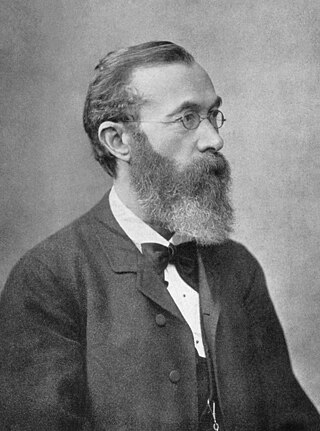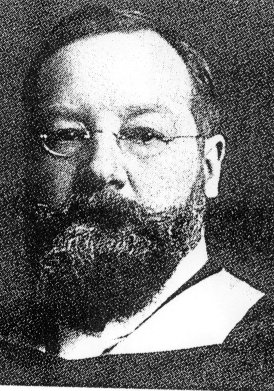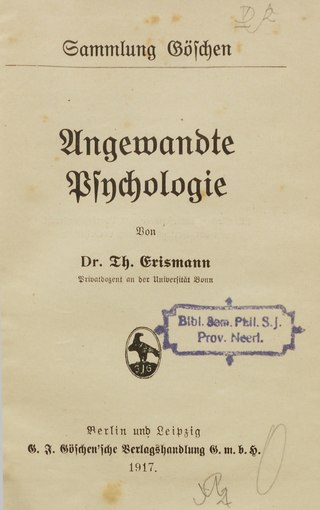Critical psychology is a perspective on psychology that draws extensively on critical theory. Critical psychology challenges the assumptions, theories and methods of mainstream psychology and attempts to apply psychological understandings in different ways, often looking towards social change as a means of preventing and treating psychopathology.
Psychology is the study of mind and behavior. Its subject matter includes the behavior of humans and nonhumans, both conscious and unconscious phenomena, and mental processes such as thoughts, feelings, and motives. Psychology is an academic discipline of immense scope, crossing the boundaries between the natural and social sciences. Biological psychologists seek an understanding of the emergent properties of brains, linking the discipline to neuroscience. As social scientists, psychologists aim to understand the behavior of individuals and groups.

Wilhelm Maximilian Wundt was a German physiologist, philosopher, and professor, known today as one of the fathers of modern psychology. Wundt, who distinguished psychology as a science from philosophy and biology, was the first person ever to call himself a psychologist.

James McKeen Cattell was the first professor of psychology in the United States, teaching at the University of Pennsylvania in Philadelphia. He was a long-time editor and publisher of scientific journals and publications, including Science, and served on the board of trustees for Science Service, now known as Society for Science & the Public from 1921 to 1944.
Introspection is the examination of one's own conscious thoughts and feelings. In psychology, the process of introspection relies on the observation of one's mental state, while in a spiritual context it may refer to the examination of one's soul. Introspection is closely related to human self-reflection and self-discovery and is contrasted with external observation.
Experimental psychology refers to work done by those who apply experimental methods to psychological study and the underlying processes. Experimental psychologists employ human participants and animal subjects to study a great many topics, including sensation, perception, memory, cognition, learning, motivation, emotion; developmental processes, social psychology, and the neural substrates of all of these.
Forensic psychology is the practice of psychology applied to the law. Forensic psychology is the application of scientific knowledge and methods to help answer legal questions arising in criminal, civil, contractual, or other judicial proceedings. Forensic psychology includes research on various psychology-law topics, such as jury selection, reducing systemic racism in criminal law, eyewitness testimony, evaluating competency to stand trial, or assessing military veterans for service-connected disability compensation. The American Psychological Association's Specialty Guidelines for Forensic Psychologists reference several psychology subdisciplines, such as social, clinical, experimental, counseling, and neuropsychology.

Edward Bradford Titchener was an English psychologist who studied under Wilhelm Wundt for several years. Titchener is best known for creating his version of psychology that described the structure of the mind: structuralism. After becoming a professor at Cornell University, he created the largest doctoral program at that time in the United States. His first graduate student, Margaret Floy Washburn, became the first woman to be granted a PhD in psychology (1894).
Theoretical psychology is concerned with theoretical and philosophical aspects of psychology. It is an interdisciplinary field with a wide scope of study.

Edwin Garrigues (Garry) Boring was an American experimental psychologist, Professor of Psychology at Clark University and at Harvard University, who later became one of the first historians of psychology. A Review of General Psychology survey, published in 2002, ranked Boring as the 93rd most cited psychologist of the 20th century, tied with John Dewey, Amos Tversky, and Wilhelm Wundt.
Psychology is defined as "the scientific study of behavior and mental processes". Philosophical interest in the human mind and behavior dates back to the ancient civilizations of Egypt, Persia, Greece, China, and India.

Kurt Lewin was a German-American psychologist, known as one of the modern pioneers of social, organizational, and applied psychology in the United States. During his professional career Lewin applied himself to three general topics: applied research, action research, and group communication.
Mathematical psychology is an approach to psychological research that is based on mathematical modeling of perceptual, thought, cognitive and motor processes, and on the establishment of law-like rules that relate quantifiable stimulus characteristics with quantifiable behavior. The mathematical approach is used with the goal of deriving hypotheses that are more exact and thus yield stricter empirical validations. There are five major research areas in mathematical psychology: learning and memory, perception and psychophysics, choice and decision-making, language and thinking, and measurement and scaling.
Oswald Külpe was a German structural psychologist of the late 19th and early 20th century. Külpe, who is lesser known than his German mentor, Wilhelm Wundt, revolutionized experimental psychology at his time. In his obituary, Aloys Fischer wrote that, “undoubtedly Külpe was the second founder of experimental psychology on German soil; for with every change of base he made it a requirement that an experimental laboratory should be provided.”

Charles Hubbard Judd was an American educational psychologist who played an influential role in the formation of the discipline. Part of the larger scientific movement of this period, Judd pushed for the use of scientific methods to the understanding of education and, thus, wanted to limit the use of theory in the field. Judd who was known for applying scientific methods to the study of educational issues.
Structuralism in psychology is a theory of consciousness developed by Edward Bradford Titchener. This theory was challenged in the 20th century.
Ludy T. Benjamin Jr. is an American psychologist and historian of psychology. He retired from Texas A&M University in 2012. He is a charter member of the Association for Psychological Science and a former director of the Office of Educational Affairs at the American Psychological Association (APA). He was president of two APA divisions, wrote more than 20 books and authored more than 150 journal articles and book chapters.
Völkerpsychologie is a method of psychology that was founded in the nineteenth century by the famous psychologist, Wilhelm Wundt. However, the term was first coined by post-Hegelian social philosophers Heymann Steinthal and Moritz Lazarus.

The book "Angewandte Psychologie", by the Swiss-Austrian psychologist and philosopher Theodor Paul Erismann, was published in 1917 in Berlin and Leipzig. It discusses major topics concerning school, work, law and their connections to psychology. The book aims at giving a short overview of how psychology can be applied to important areas in life. Erismann uses many applicable tests and describes them in great detail, thus providing a practical guideline on how to use the findings of psychology in different fields.
History of Psychology refers to the academic discipline concerned with studying the history of the study of psychology. Another term would be historiography of psychology. Postsecondary course titles and textbooks often combine history and systems of psychology; one chapter may address the history and tenets of structuralism, a subsequent chapter functionalism, a subsequent chapter behaviorism, etc.






